|
|
|
Sort Order |
|
|
|
Items / Page
|
|
|
|
|
|
|
| Srl | Item |
| 1 |
ID:
149530
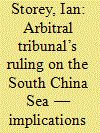

|
|
|
|
|
| Summary/Abstract |
Three and a half years after the Philippines took the unprecedented step of challenging the legal basis of China’s expansive maritime claims in the South China Sea, the Arbitral Tribunal established under compulsory dispute resolution provisions contained in the United Nations Convention on the Law of the Sea (UNCLOS), and based at the Permanent Court of Arbitration in The Hague, issued its final ruling on 12 July 2016.
|
|
|
|
|
|
|
|
|
|
|
|
|
|
|
|
| 2 |
ID:
149541
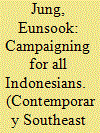

|
|
|
|
|
| Summary/Abstract |
Many scholars argue that democratization is conducive to the development of social welfare policies and that democracy brings about redistributive reform due to demands from the newly enfranchised poor. In reality, however, democratization does not necessarily bring about comprehensive social welfare reform. If not democratization, what explains social welfare expansion in developing countries? This article examines Indonesia, which began the process of democratization in 1998 following the fall of President soeharto, and which has since become a stable democracy with a consistently growing economy. More than a decade after soeharto’s resignation, Indonesia started to implement a comprehensive healthcare policy. What explains the gap between the enactment and the implementation of this social policy reform? In answering this question, I argue that electoral competition alone does not shape social policy reform. Instead, social reform has institutional prerequisites, such as the broad-based organization of its advocates. A broad-based organization goes beyond its narrow interests, builds cross-class alliance and pressures the government. Without this prerequisite, democratization does not necessarily result in comprehensive social reforms.
|
|
|
|
|
|
|
|
|
|
|
|
|
|
|
|
| 3 |
ID:
149538
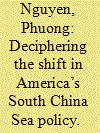

|
|
|
|
|
| Summary/Abstract |
China’s massive reclamation work in the disputed Spratly Islands in the South China Sea between 2013 and 2015 was a turning point in US policy towards the South China Sea. China intends to use the artificial islands it has constructed — and the infrastructure it is in the process of installing on them — for military purposes. While for many years the United States largely positioned itself above the long-simmering territorial and maritime jurisdictional disputes between China and five Southeast Asian countries, the prospect of China using its buildup in the southern reaches of the South China Sea to establish greater control of its near seas, in the process diminishing US access to the waters and airspace of the world’s most critical waterways, prompted a reassessment in Washington about the South China Sea being part of larger US core interests, and its grand strategy in the Western Pacific. Washington has responded to China’s reclamation and construction spree with a new, active strategy that aims to deter China from taking further actions at its reclaimed features that would alter the existing military balance of power in the region and make China pay a “net effect” for its behaviour — should it continue to pursue an aggressive course of actions — by engaging more actively with Southeast Asian partners.
|
|
|
|
|
|
|
|
|
|
|
|
|
|
|
|
| 4 |
ID:
149537
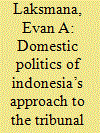

|
|
|
|
|
| Summary/Abstract |
Indonesia’s immediate response to the 12 July ruling by the Arbitral Tribunal was under-whelming. The foreign ministry issued a bland, lacklustre five-sentence statement:
|
|
|
|
|
|
|
|
|
|
|
|
|
|
|
|
| 5 |
ID:
149531
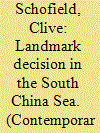

|
|
|
|
|
| Summary/Abstract |
On 12 July 2016, the Arbitral Tribunal in the case between the Philippines and China delivered its award.1 The Tribunal’s ruling represents a sweeping victory for the Philippines and fundamentally alters the international legal land, or more appropriately, seascape of the South China Sea. This article has three aims: first, to outline the character of the Tribunal and the status of its award; second to summarize the Tribunal’s main findings; and third, to explore some of the potential implications of the award, both within and beyond the South China Sea.
|
|
|
|
|
|
|
|
|
|
|
|
|
|
|
|
| 6 |
ID:
149536
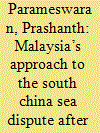

|
|
|
|
|
| Summary/Abstract |
Malaysia has traditionally adopted a “playing it safe” approach to the South China Sea designed to secure its claims while simultaneously ensuring that it preserves its important bilateral relationship with China. Ahead of the ruling by the Arbitral Tribunal on 12 July 2016, that approach had come under increasing scrutiny, given the bolder and more frequent Chinese encroachments into Malaysian waters as well as some other diplomatic incidents in the Sino-Malaysian relationship.
|
|
|
|
|
|
|
|
|
|
|
|
|
|
|
|
| 7 |
ID:
149532


|
|
|
|
|
| Summary/Abstract |
The Philippines is in the midst of a transition. The astonishing rise and decisive victory of Rodrigo Duterte in the presidential election in May 2016 marked a significant turning point in Philippine politics. Manila’s longstanding territorial and maritime boundary disputes with Beijing in the South China Sea are among the most immediate and intricate foreign policy challenges facing President Duterte. However, in an unexpected twist, previously acrimonious bilateral relations with China have demonstrated signs of improvement while Duterte’s relentless and fiercely critical rhetoric against the United States has placed the country’s robust and longstanding security and defence relations with America in question. This turn of events heralds uncertain times for both the Philippines and Southeast Asia.
|
|
|
|
|
|
|
|
|
|
|
|
|
|
|
|
| 8 |
ID:
149542
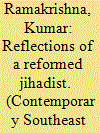

|
|
|
|
|
| Summary/Abstract |
On 29 August 2012, a rehabilitated former senior member of the Jemaah Islamiyah (JI) terror network, Wan Min Wan Mat, delivered a lecture to a group of Malaysian counter-terrorism practitioners in which he sketched out the ideological rationale and aims of the JI network, unpacked in some detail its recruitment and indoctrination philosophy and methodology and also examined what in his personal view are potentially useful strategies for rehabilitating JI militants or preventing the further dissemination of JI extremist ideas. This article examines and evaluates some of the key insights made by Wan Min in his lecture, and argues that his musings are more than mere historical interest in that they have direct relevance to the current struggle against the latest incarnation of the continually evolving violent jihadist threat in Southeast Asia and globally, namely the Islamic State of Iraq and Syria (ISIS or IS). The central reason for this is that the same broad ideology that animated JI — Salafi Jihadism — basically motivates ISIS as well. Hence, even allowing for dissimilarities in time and space, Wan Min’s insights about JI could well provide useful pointers for counter-terrorism practitioners and specialists dealing with the ISIS threat today.
|
|
|
|
|
|
|
|
|
|
|
|
|
|
|
|
| 9 |
ID:
149540


|
|
|
|
|
| Summary/Abstract |
Since the early 2000s, “soft power” has become one of the most popular analytical tools in International Relations scholarship devoted to analyzing the influence of states in the international arena. Although scholars of Russian foreign policy have also embraced the notion of “soft power”, they have mainly limited the scope of their analysis to Western countries and the former Soviet republics. In contrast, this article focuses on Laos, Vietnam and Thailand, countries whose history of relations with Russia are fundamentally different from both the West and Russia’s “near abroad”. By analyzing the images of Russia and its soft power resources in these countries, this article seeks to create a more comprehensive understanding of the ways contemporary Russia is perceived in the world and its potential tools of influence in Southeast Asia. Drawing on the results of a survey conducted among university students, this article examines the ways young educated elites in the three countries perceive Russia. It also explores the degree of correspondence between these images and the self-image of Russia espoused by its political elites. The results of this study suggest that while overall Russia is perceived as a Great Power, and its role in the world is seen as mostly positive, there are also important dissonances between the two images. Based on discernible differences among the three groups of respondents in the ways they perceive Russia, the article also suggests that historical memory plays an important role in shaping these perceptions.
|
|
|
|
|
|
|
|
|
|
|
|
|
|
|
|
| 10 |
ID:
149533
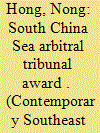

|
|
|
|
|
| Summary/Abstract |
The release of the Arbitral Tribunal’s award on 12 July 2016 brought to an end the arbitration case on the South China Sea which the Philippines had unilaterally brought against China in January 2013. This thoroughly one-sided award ruled that many of China’s maritime claims in the South China Sea were contrary to the United Nations Convention on the Law of the Sea (UNCLOS) and had thereby violated Philippine sovereign rights and freedoms. The ruling does not mean that the dispute between the Philippines and China is over. But it does have political and legal implications for China, especially its future approach to managing and eventually resolving the country’s maritime disputes.
|
|
|
|
|
|
|
|
|
|
|
|
|
|
|
|
| 11 |
ID:
149535
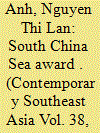

|
|
|
|
|
| Summary/Abstract |
The Arbitral Tribunal award on the South China Sea, issued on the 12 July 2016, was a legal game changer.1 As a major claimant in the South China Sea, the award has significant implications for Vietnam. This article addresses both the opportunities and challenges for Vietnam, as well as the short term and long term impacts of the Tribunal’s award.
|
|
|
|
|
|
|
|
|
|
|
|
|
|
|
|
| 12 |
ID:
149534


|
|
|
|
|
| Summary/Abstract |
The Arbitral Tribunal’s award of 12 July 2016 was overwhelmingly in favour of the Philippines and denounced by China. Although the Republic of China (ROC, or Taiwan) was not a party to the arbitration, it was dragged into the proceedings, as the issue of the status and entitlements of Itu Aba — the largest geographical feature in the Spratly Islands, occupied by Taiwan and also known as Taiping Island — gained prominence in the course of the Tribunal’s deliberations.
|
|
|
|
|
|
|
|
|
|
|
|
|
|
|
|
| 13 |
ID:
149539


|
|
|
|
|
| Summary/Abstract |
This article utilizes the elements of leadership, political performance and national interests to understand China’s foreign policy decision-making process. In contrast to a state-centred analysis, this article assumes that the supreme leadership’s view of political performance is the most important factor when it comes to foreign policy decision-making. it contends that so-called national interests are often manipulated to serve particular political agendas. Specifically, this article explores whether the One Belt, One Road (OBOR) initiative or advancing China’s interests in the South China Sea can be better utilized to improve Chinese President Xi Jinping’s political performance. The comparison between the two issues incorporates the dimensions of feasibility, significance and morality. In the final analysis, this article finds that the OBOR is likely to be better utilized to enhance Xi’s political performance, which yields some salient implications for future trends in China’s foreign policy.
|
|
|
|
|
|
|
|
|
|
|
|
|
|
|
|
|
|
|
|
|